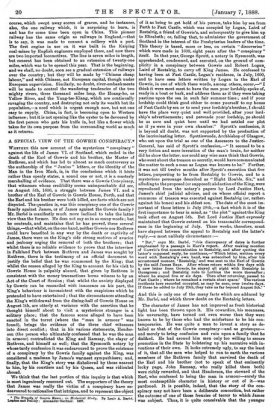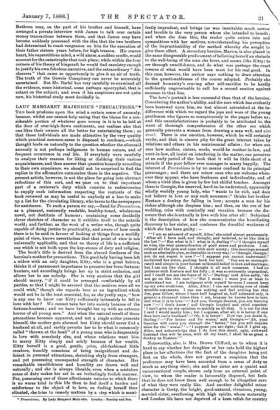A SPECIAL VIEW OF THE GOWRIE CONSPIRACY.* WHETHER this new
account of the mysterious " conspiracy " against the life of James VI. of Scotland, which ended in the
death of the Earl of Gowrie and his brother, the Master of Rnthven, and which has led to almost as much controversy as -the authorship of the " Junius " letters, or the identity of the Man in the Iron Mask, is, in the conclusions which it hints rather than openly states, a sound one or not, it is a masterly marshalling of evidence. That there was a Gowrie Conspiracy, that witnesses whose credibility seems unimpeachable did see, on August 5th, 1600, a struggle between James VI. and a brother of the Earl of Gowrie in Gowrie House, Perth, and that the Earl and his brother were both killed, are facts which are not disputed. The question is, was this conspiracy one of the Gowrie family against James, or of James against the Gowrie family ? Mr. Barbe is manifestly much more inclined to take the latter view than the former. He does not say so in so many words ; but he contends, and maintains that he has proved, these several things,—that whilst, on the one hand, neither Gowrie nor Ruthven could have benefited in any way by the death or captivity of James, there were on the King's side strong motives of avarice and jealousy urging the removal of both the brothers ; that whilst there is no reliable evidence to prove that the interview in Falkland Park between Ruthven and James was sought by Ruthven, there is the testimony of an official document to justify the belief that he was summoned by the King; that whilst the reason alleged by the King to account for his visit to Gowrie House is palpably absurd, that given by Ruthven is -consistent with the money transactions borne witness to by an -Act of the Court of Session; that whilst the anxiety displayed by Gowrie can be reconciled with innocence on his part, the King's behaviour is inconsistent with the suspicions which he pretended to have entertained ; that the circumstances attending the King's withdrawal from the dining-hall of Gowrie House on August 5th, are utterly at variance with the assertion that he thought himself about to visit a mysterious stranger in a solitary place ; that the famous scene alleged to have been enacted in the turret (where the "man in armour" was found), brings the evidence of the three chief witnesses into direct conflict ; that in his various statements, Hender- son (the person who ultimately confessed that he was the man in armour) contradicted the King and Ramsay, the slayer of Ruthven, and himself as well; that the Eyemouth notary by whose tardy confession it was endeavoured to prove the existence of a conspiracy by the Gowrie family against the King, was considered a madman by James's warmest sympathisers; and, finally, that the King's story was disbelieved by those nearest to him, by his courtiers and by his Queen, and was ridiculed abroad.
We think that the last portion of this inquiry is that which is most ingeniously reasoned out. The supporters of the theory that James was really the victim of a conspiracy have en- deavoured to rationalise that intrigue, and to represent the object
The Tragedy of Howie House: an Historical Study. By Louis A. Barbe. London and Paidey : Alexander Gardner. 1887. of it as being to get hold of his person, take him by sea from Perth to Fast Castle, which was occupied by Logan, Laird of Restalrig, a friend of Gowrie's, and subsequently to give him up to Elizabeth ; or, failing that, to administer the government of Scotland in the interest of the Presbyterian leaders of the time. This theory is based, more or less, on certain " discoveries " which were made in 1608, eight years after the " conspiracy " itself. In that year, George Sprott, a notary in Byelaw:1th, was apprehended, condemned, and executed, on the ground of com- plicity in a conspiracy between Gowrie and Robert Logan, Laird of Restalrig, to carry off King James. He confessed to having been at Fast Castle, Logan's residence, in July, 1600, and to have seen letters written by Logan to the Earl of Gowrie, in one of which these words, among others, occur,—" I
think it were most meet to have the men your lordship spoke of, ready in a boat or bark, and address them as if they were taking pastime upon the sea in such fair summer time ; and if your lordship could think good either to come yourself to my house of Fast Castle by sea or to send your lordship's brother, I should have the place very quiet and well provided, after your lord- ship's advertisements ; and persuade your lordship, ye should be as sure and quiet here until we had settled our plot as if ye were in your own chamber." Sprott's confession, it is beyond all doubt, was not supported by the production of the incriminating letter. Spottiswoode, Archbishop of Glasgow, who sat upon the trial as one of the Assessors to the Justice.
General, has said of Sprott's confession,—" It seemed to be a very fiction and mere invention of the man's brain, for neither did he show the letter, nor could any wise man think that Gowrie, who went about the treason so secretly, would have communicated the matter to such a man as Logan was known to be." Further, it was not till twelve months after Sprott's execution that five letters, purporting to be from Restalrig to Gowrie, and to a mysterious personage described as "Right Honble. Sir," and alluding to the proposed (or supposed) abduction of the King, were reproduced from the notary's papers by Lord Justice Hart, James's chief judicial adviser, and on whose official report a
summons of treason was executed against Restalrig (or, rather, against his bones) and his eldest son. The date of the most im- portant of these letters is July ;29th,—a fact which it is of the first importance to bear in mind, as the plot" against the King took effect on August 5th. But Lord Justice Hart expressly maintained that Gowrie entered on his treasonable correspond- ence in the beginning of July. Three weeks, therefore, must have elapsed between the appeal to Restalrig and the latter's reply.—a most unlikely circumstance :— "But," says Mr. Bathe, "this discrepancy of dates is further emphasised by a passage in Hart's report. After making mention of Gowrie's first communication to Restalrig, and after quoting the latter's supposed reply, he continues,—' Which letter, written every word with Restalrig's own hand, was subscribed by him, after his accustomed manner, Restalrig,' and was Bent to the Earl of Gowrie by the said James Baur. After whose return within five days with a new letter from Gowrie, he stayed all night with Restalrig in Gunsgreen ; and Restalrig rode to Lothian the morn thereafter; where he stayed five or six days. Then after returning, passed to Fast Castle ; where he remained a certain short space.' The various incidents here recorded occupied, as may be seen, over twelve days. If these be added to July 29th, they take us far beyond August 5th."
And this is only one of the many facts which are adduced by Mr. Barb, and which throw doubt on the Restalrig letters.
The character of James has not improved as fresh historical light has been thrown upon it. His cowardice, his meanness, his nnveracity, have turned out even worse than they were known to be by those who had the misfortune to be his con- temporaries. He was quite a man to invent a story as de- tailed as that of the Gowrie conspiracy—and as grotesque— and merely to bring confusion and ruin upon a family that he disliked. He had around him men only too willing to secure promotion in the State by bolstering up his narrative with in- ventions of their own. It looks extremely ugly, to say the least of it, that all the men who helped to run to earth the various members of the Ruthven family that survived the death of the Earl and his brother (not to speak of that eminently lucky page, John Ramsay, who really killed them both) were richly rewarded, and that Henderson, the steward of the Earl, who confessed to being the man in armour—surely the most contemptible character in history or out of it—was pardoned. It is possible, indeed, that the story of the con- spiracy may not have been a deliberate concoction, but rather the outcome of one of those frenzies of terror to which James was subject. Thus, it is quite conceivable that the younger
Ruthven may, on the part of his brother and himself, have arranged a private interview with James to talk over certain money transactions between them, and that James may have become suddenly possessed with the idea that the two brothers had determined to exact vengeance on him for the execution of their father sixteen years before, for high treason. His craven heart, his superstitions mind, a wild alarm, a sudden scuffle, would account for the catastrophe that took place; while within the four corners of his theory of kingcraft he would find casuistry enough to justify his own fabulous narrative, and the extraordinary" dis- closures' that came so opportunely to give it an air of truth. The truth of the Gowrie Conspiracy can never be accurately ascertained. But Mr. Barb6 has very carefully re-examined all the evidence, some historical, some perhaps apocryphal, that is extant on the subject; and even if his suspicions are not quite new, his historical study most decidedly is.























































 Previous page
Previous page